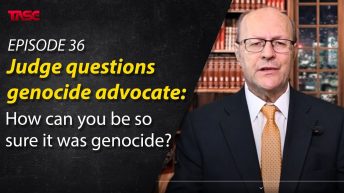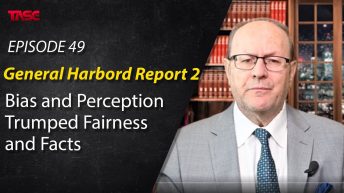Bristol summarized his attitude towards the peoples of Anatolia in a letter of December 27, 1920 to Mr. Walter George Smith, in the following terms: I quote: “I have often said to you, these races in the Near East are all very much the same, and if you put them all in a bag and shake them up you would not know which one would come out first.” Unquote.
It is this “shake them in a bag” philosophy which typifies Bristol’s attitude towards the indigenous peoples of Anatolia. As the selection of quotations given above indicate, only the most committed “anti-Turk” could in any way view his position as “pro-Turkish.” Bristol was first and foremost a product of his times. He was an American protestant who believed that his “brand” of civilization alone held some promise for the future of mankind. This quotation from his correspondence illustrates this point. In his May 3, 1920 letter to Edward C. Moore he wrote: I quote: “I hold no beef for any race in this part of the country. They all need universal education and modern civilization. The future peace of the world depends upon these races getting the benefits of modern development.” Unquote.
Given this view of Bristol, how can anyone explain the widespread view in works of Armenian scholars, of Bristol as “pro-Turkish” and “anti-minority”? One only must read the works of his predecessor in Istanbul, the racist and deveious Ambassador Henry Morgenthau to answer this question. Contrast the “tone” of the following Morgenthau statement with that of the Bristol passages quoted earlier.
I quote: “Will the Turks be permitted… by our cowardice in not striking back, to continue to treat all Christians in their power as ‘unbelieving dogs?’ Or will definite steps be promptly taken to rescue permanently the remnants of these fine, old, civilized Christian peoples from the fangs of the Turk?” Unquote. In short, Morgenthau was a confirmed “Turcophobe” whose hatred for the Turks was matched only by his unabashed support for the Christian minorities under Ottoman rule. To anyone sharing Morgenthau’s prejudices, Bristol’s evenhanded objectivity could only be interpreted as “pro-Turkish.”
Bristol’s insistence on the equality of Christian and Moslem alike, marked a drastic change from Morgenthau’s championing of the Christian element. It is this fact which accounts for his being incorrectly labeled as “pro-Turkish” and “anti-minority.” In Bristol’s “War Diary” entry of May 3, 1921, he provides a lengthy report of a conversation he held that day with Mr. G. T. White of the near East Relief Committee, who had recently arrived in Istanbul from Kars. In the words of Bristol, George White, who had been in Kars at the time of the Turkish occupation, had the following to say regarding claims that the Turkish forces had massacred Armenians in the city: “When questioned carefully in regard to the treatment of the Armenians by the Turks after they had occupied Kars, Mr. White stated that he did not know of any massacres and did not believe there had been any, except in the case of two villages where some Turkish officers had been killed by the Armenians and in retaliation the Turks had wiped out these villages and, though he was not certain, he had no doubt that people in the villages had been wiped out. In one other case he believes that about thirty Armenians were shot in Kars just after the occupation by the Turks.
I asked Mr. White what he thought of the statement made by Mr. McCallum of the Near East Relief in a telegram to the United States stating that 80,000 Armenians had been massacred by the Turks. Mr. White did not reply to this question, but at first exclaimed “Yes, I have talked with Mr. McCallum in regard to that.” Mr. White had already answered this question by stating that there had been no wholesale massacres by the Turks. There was no doubt in my mind that Mr. White was embarrassed to find such a statement had been telegraphed to the United States.” To what extent have the contents of the Bristol Papers been utilized by scholars dealing with Turkish-Armenian conflict between 1919 and 1921?




Add comment